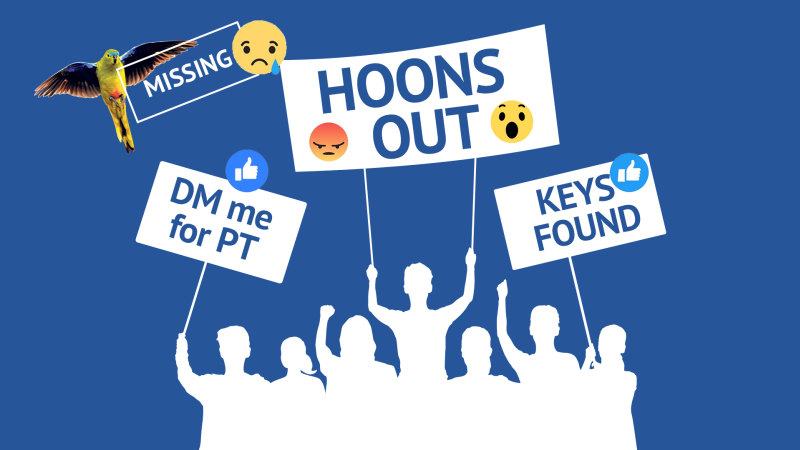Save articles for later
Add articles to your saved list and come back to them any time.
Somewhere in my suburb right now, there is a rare white Macaw on the loose named Milo. According to all available intel, Milo is house-trained and quite friendly, so any help would be greatly appreciated (though there is no reward on offer, sorry).
I’d love to join the search for Milo, but a more pressing local issue requires my attention; someone is letting off fireworks or gunshots. No one can be sure which it is, though I certainly hope it is the former for my sake (and Milo’s).
Facebook community groups offer everything from advice to entertainment.Credit: Marija Ercegovac
As if that’s not a stressful enough day in the neighbourhood, I’ve just learnt that three young boys wearing hoods (!) have been spotted walking the streets. We do not know what they are doing or where they are headed, but that doesn’t mean we shouldn’t wildly speculate.
Why do they have hoods on? Are they connected to the alleged gunshots? This whole suburb has changed for the WORSE. We never used to have teens or hoods or gunshots.
Welcome to another day in the increasingly bizarre world of community-based Facebook groups.
A few years ago, we all made a silent pact that Facebook was finished, and it was best to make a quiet exit. Zuckerberg could keep my data and the 600 photos I posted from a single night out in 2011 and, in exchange, I would log on once a year to check who had wished me a happy birthday.
Unfortunately, this plan didn’t account for what would come next: those left behind would begin bickering on local community-based Facebook groups for our amusement. For the unfamiliar, these groups are an online community composed entirely of people already part of an actual, physical community.
They are typically run by a powerful few – the admins – who do their best to moderate what is discussed while also regularly reminding everyone that being an admin is HARD and NOT a FULL-TIME JOB! We are volunteers!
At their essence, the groups are supposed to act as a digital notice board, a place where locals come together and trade ideas, share updates or ask for advice.
Need an electrician or a plumber? Chuck it in the group. Does your daughter want to take up dance lessons? Post away. In a rage about people not picking up after their dogs at the park? Vent your fury and watch the comments roll in.
They’re also quite handy if you’re new to an area or desperate to flog your small business (if you’re looking for a personal trainer or a tutor, my suburb seems to be flush with both).
But because this is the internet, it’s only a matter of time before the wholesome updates get hijacked by the angry and bored – and that’s where the chaos begins.
An innocent post about the best TV shows for kids descends into an ideological argument about screen time. A request for delicious local vegetarian restaurants turns toxic when an antagonistic meat eater enters the chat: “Just have a steak LOL.”
Perhaps you logged on to ask a question about removing a possum from your roof, only to find yourself scrolling through hundreds of comments on a thread concerning a man seen “suspiciously knocking on doors”.
A pact to log on once a year to check birthday messages has gone unfulfilled for many. Credit: AP
This person was probably a postman, but through the paranoid filter of the local Facebook group, he becomes a menace, a pest, a hoodlum; call the police! It’s normally around this time we see the casual racists rear their heads, posting insane theories about which minority is likely responsible.
Before long, the entire thing has become a gross mess. Meanwhile, your possum problem remains unsolved.
It’s enough to convince you that you’re better off deleting Facebook for good; if this is what connection looks like in 2023, then you’d rather go without.
Then just as you’re about to log off, along comes a post that restores your faith in humanity. Milo has been found safe and sound, reunited with his worried owners; he lives to fly another day. In the comments section, people are overjoyed for these strangers and their birds; the well-wishes and congratulations pile up.
I hold myself back from posting that Milo, the rare white macaw, appears to be a run-of-the-mill cockatoo and instead choose to enjoy the moment – it’s the least I can do for my community.
Find more of the author’s work here. Email him at [email protected] or follow him on Instagram at @thomasalexandermitchell and on Twitter @_thmitchell.
The Booklist is a weekly newsletter for book lovers from books editor Jason Steger. Get it delivered every Friday.
Most Viewed in National
From our partners
Source: Read Full Article




